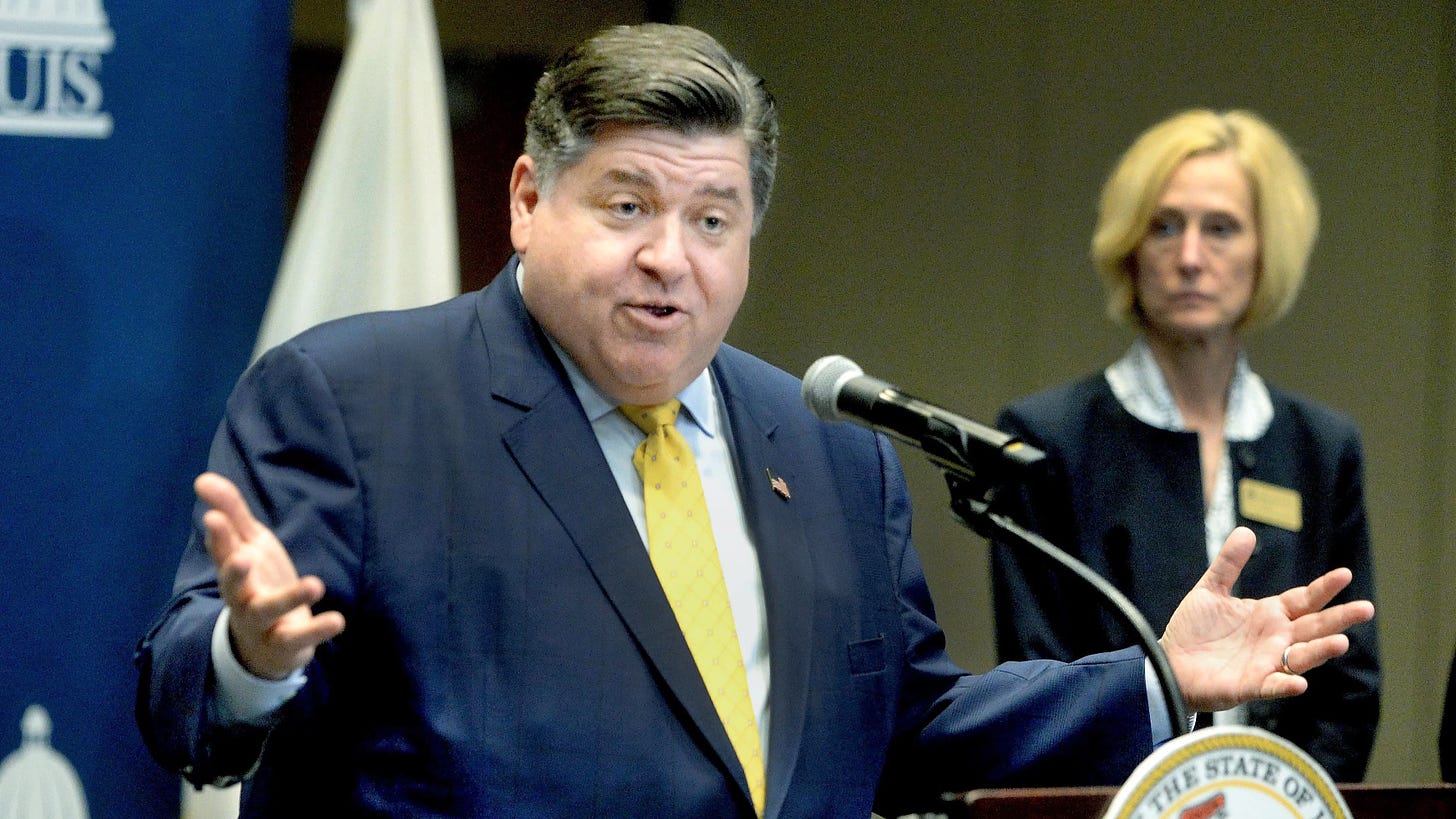THE ILLINOIZE: Thursday Free for All...Pritzker touts budget...Ameren's giveaway...Trib totally whiffs on struggles of rural communities
June 1, 2023
Good morning, Illinois. Rabbit, rabbit.
As you likely heard, the U.S. House passed the debt ceiling deal last night, a bill that was not great for anyone, making it a pretty decent, you know, compromise.
All three Illinois Republicans, Mike Bost, Mary Miller, and Darin LaHood voted against the bill. Three super-progressive Democrats, Delia Ramirez, Chuy Garcia, and Jan Schakowsky, all voted against the deal.
Paid subscribers got a breaking news alert last night on the political ramifications of one of the votes. All of our newsletter content is now for paid subscribers only. Join us, will you? It’s the best way to show your support of the independent work we’re doing here.
Governor Pritzker goes below the Mason-Dixon line today, selling the state budget with stops in Mt. Vernon, Carbondale, and Fairfield.
Let’s get to it.
YOUR THURSDAY FREE FOR ALL
(note: we’re not responsible for paywalls and restrictions from other news outlets, but know good journalism isn’t free)
Gov. Pritzker touts higher education investments included in recently passed budget (State Journal-Register)
On Wednesday, local political and educational leaders touted higher education spending - the likes of which have not been seen in 20 years they say - included in the recently passed $50.4 billion state budget.
Gov. JB Pritzker at the University of Illinois-Springfield Student Union touted the budget, now awaiting his signature, as including several line items for construction projects on campus and increases investment into the Monetary Award Program by $100 million. Fiscal year 2024, starting in July, will have $701 million in total investment into program — a 75% increase since the beginning of the Pritzker administration.
Rep. Mike Coffey, R-Springfield, was also in attendance and expressed support for several appropriations and reappropriations heading towards UIS.
He and all other Republicans in both chambers, however, voted against the budget. Coffey's reasons for his 'no' vote were namely due to another increase to state legislator pay and feeling left-out on budget negotiations with the super-majority party.
Coffey and Sen. Steve McClure, R-Springfield were joined by one of a handful of Democrats such as Sen. Doris Turner, D-Springfield, in opposing the budget.
Related: Gov. J.B. Pritzker touts higher education funding to kick off tour promoting state budget (Chicago Tribune)
Guv touts new budget (WTAX)
Pritzker touts new budget’s higher education spending (Capitol News Illinois)
Utilities get first crack at new transmission lines under bill, but Pritzker vows veto (Bloomington Pantagraph)
During the final days of legislative session, it’s not uncommon to see a flurry of amendments filed to bills up for consideration.
Oftentimes, these are cleaning up technical language, or reflect a compromise among key stakeholders on an issue. Other times, the amendment becomes the bill. In this instance, large measures can circumvent the typical process, which requires a bill to be read three days in the other legislative chamber.
And then there’s what happened last week, when a pair of downstate utility companies, a collection of trade unions and their allies in the legislature dropped an amendment onto an existing energy bill in the waning hours of session that would give the utilities first dibs on building out new electrical transmission lines.
Proponents say the measure is needed to expedite the buildout of new transmission lines, which are widely seen as necessary for the state to meet its clean energy goals. Without competitive bidding, they say, years can be saved. And the work can be done by people already familiar with the grid.
“It’s easier for them to do this type of work and interconnect into their system because they ... know it like the back of their hand because they’ve been operating it for 100 years,” said state Rep. Larry Walsh, D-Elwood. “So they would know the intricacies to be able to put this system ... on time and be able to operate.”
Shawn Schukar, president of Ameren Transmission Company Illinois, told Lee Enterprises in a statement that the bill “will ensure that new, much needed transmission capacity is quickly and cost effectively placed into service, maintaining the safety and reliability of the transmission system and benefitting Illinois consumers and communities.”
Critics, however, charge that the measure essentially gives utility companies, namely Ameren, a monopoly that will drive up construction costs and, ultimately, rates for consumers.
Energy prices are already through the roof and this bill gives Ameren carte blanche to raise rates further. It’s a bad bill.
Related: Lawmakers approve measure giving utilities control over new downstate transmission lines (Capitol News Illinois)
Editorial: Last-minute power grid bill is bad for Illinois transition to renewable energy (Chicago Sun-Times)
Some rural communities in Illinois are pushing back against the narrative that they’re dying (Chicago Tribune)
Hack Street isn’t exactly Michigan Avenue.
The main thoroughfare of downstate Cullom — a town of around 600 about halfway between Bourbonnais and Bloomington — showcases cement geese hand-molded by the mayor and a market often staffed by one clerk.
But don’t confuse a quiet town with a dead one. Cullom’s business center is crowded, its high school enrollment is stable, and most homes here are occupied, so trying to buy one can be difficult.
Rural towns like Cullom stand in contrast to some larger downstate communities that have struggled amid population loss and a changing national landscape over the past half-century as companies that once employed hundreds have left and stores on rural Main Streets have closed.
These smaller towns also are being used as examples by advocates for rural development who are trying to change the narrative about how small towns — and rural America as a whole — are perceived.
Indeed, residents and leaders in Cullom and Wenona, a town of 1,000 an hour’s drive away and about 25 miles south of the LaSalle-Peru area, say their towns are very much in demand. Cullom Mayor Barbara Hahn said that people — mostly from larger cities around the state — call her “all the time” to see if there are any houses for sale and she mostly has to tell them that the housing stock is at capacity.
“I think it’s where they want to raise their families,” Hahn said of the callers. “Right now, I believe we have one house for sale. … A house goes for sale and generally it’s not on the market long.”
I grew up about 30 minutes east of Cullom and have driven to, around, or through that town about 1,000 times in my life. The Tribune is painting a rosy picture that isn’t the case for many of our small towns. Cullom’s high school, Tri-Point, has seen its enrollment drop by almost half since 2009. The town has dropped population in every census since 1980, is plurality over 65, and has a median household income just over $30,000 per year. You can say a lot of the same things as my hometown, Crescent City, in the next county over.
The problem, more than anything, is jobs and workforce. Farms don’t fill the number of jobs they did fifty years ago, and no small town that isn’t within driving distance of a metro area (Cullom is 25 minutes from Pontiac and its manufacturing jobs and a little under an hour to Bloomington-Normal). And don’t even get me started on the drug and health care access challenges.
Until someone comes up with a plan to grow these small towns, they’ll just continue slowly extinguishing.
SOME LINKS FROM THE WEEK SO FAR
POLITICAL POTPOURRI
Bill to allow law enforcement drones at parades and other events passes, despite questions over personal freedom (Chicago Tribune)
Illinois lawmakers passed bills on book bans, abortion rights and other issues (WBEZ)
State lawmakers extend deadline for Chicago’s elected school board map (Chicago Tribune)
Cannabis regulatory reform bill fails to advance in spring legislative session (Capitol News Illinois)
Illinois Republicans start choosing which candidate to back in the 2024 race (Crain’s Chicago Business)
Katz Muhl to challenge Carroll for 57th District state representative (Daily Herald)
Alice Palmer, senator who mentored Barack Obama, dies at 83 (Chicago Sun-Times)
William Brandt, corporate workout expert and fundraiser for Democrats, dies at 73 (Crain’s Chicago Business)
Arlington Park's property tax bill reduced by more than half (Daily Herald)
Tax deal set on Bears' Arlington Heights property (Crain’s Chicago Business)
Editorial: As Bears begin demolition at Arlington race track, Mayor Johnson must focus on Soldier Field’s future (Chicago Sun-Times)
Krishnamoorthi: How we can win the economic contest with China (Chicago Tribune)
Opinion: Illinois needs to ensure rise of electric vehicles won’t hamper infrastructure funding (Chicago Tribune)
JOIN US












